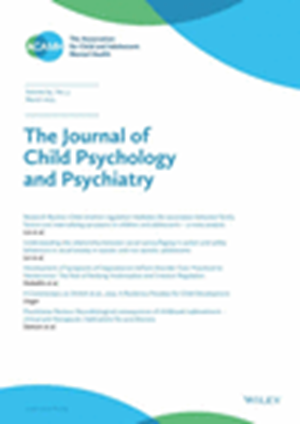The Nuffield Early Language Intervention (NELI) programme is associated with lasting improvements in children's language and reading skills
IF 6.5
1区 医学
Q1 PSYCHIATRY
引用次数: 0
Abstract
BackgroundOral language skills are a critical foundation for education and psychosocial development. Learning to read, in particular, depends heavily on oral language skills. The Nuffield Early Language Intervention (NELI) has been shown to improve the language of 4–5‐year‐old children entering school with language weaknesses in four robust trials. To date, however, there is limited evidence on the durability of the gains produced by the intervention, and some have argued that the effects of such educational interventions typically fade‐out quite rapidly.MethodsA large‐scale effectiveness trial of the NELI intervention implemented under real‐world conditions produced educationally meaningful improvements in children's language and reading abilities. Here, we report follow‐up testing of children from this study conducted approximately 2 years after the completion of the intervention.ResultsAt 2‐year follow‐up, children who had received NELI had better oral language (纳菲尔德早期语言干预(NELI)项目与儿童语言和阅读技能的持续改善有关
口语技能是教育和社会心理发展的重要基础。尤其是学习阅读,很大程度上依赖于口语技能。纳菲尔德早期语言干预(NELI)在四项强有力的试验中已被证明可以改善4-5岁入学时语言薄弱的儿童的语言。然而,到目前为止,关于干预所产生的收益的持久性的证据有限,有些人认为这种教育干预的效果通常会很快消失。方法在真实世界条件下对NELI干预进行了大规模的有效性试验,在儿童的语言和阅读能力方面产生了具有教育意义的改善。在此,我们报告了在干预完成后大约2年对本研究儿童进行的随访测试。结果在2年的随访中,接受NELI治疗的儿童口语(d = 0.22或d = 0.33)、阅读理解(d = 0.16或d = 0.24)和单字阅读技能(d = 0.16或d = 0.22)均优于对照组。我们的数据表明,虽然淡出效应在教育研究中很常见,但广泛使用的语言干预可以持久地提高语言和阅读技能,并具有重要的教育效应。这些发现具有重要的理论和实践意义。
本文章由计算机程序翻译,如有差异,请以英文原文为准。
求助全文
约1分钟内获得全文
求助全文
来源期刊
CiteScore
13.80
自引率
5.30%
发文量
169
审稿时长
1 months
期刊介绍:
The Journal of Child Psychology and Psychiatry (JCPP) is a highly regarded international publication that focuses on the fields of child and adolescent psychology and psychiatry. It is recognized for publishing top-tier, clinically relevant research across various disciplines related to these areas. JCPP has a broad global readership and covers a diverse range of topics, including:
Epidemiology: Studies on the prevalence and distribution of mental health issues in children and adolescents.
Diagnosis: Research on the identification and classification of childhood disorders.
Treatments: Psychotherapeutic and psychopharmacological interventions for child and adolescent mental health.
Behavior and Cognition: Studies on the behavioral and cognitive aspects of childhood disorders.
Neuroscience and Neurobiology: Research on the neural and biological underpinnings of child mental health.
Genetics: Genetic factors contributing to the development of childhood disorders.
JCPP serves as a platform for integrating empirical research, clinical studies, and high-quality reviews from diverse perspectives, theoretical viewpoints, and disciplines. This interdisciplinary approach is a key feature of the journal, as it fosters a comprehensive understanding of child and adolescent mental health.
The Journal of Child Psychology and Psychiatry is published 12 times a year and is affiliated with the Association for Child and Adolescent Mental Health (ACAMH), which supports the journal's mission to advance knowledge and practice in the field of child and adolescent mental health.

 求助内容:
求助内容: 应助结果提醒方式:
应助结果提醒方式:


